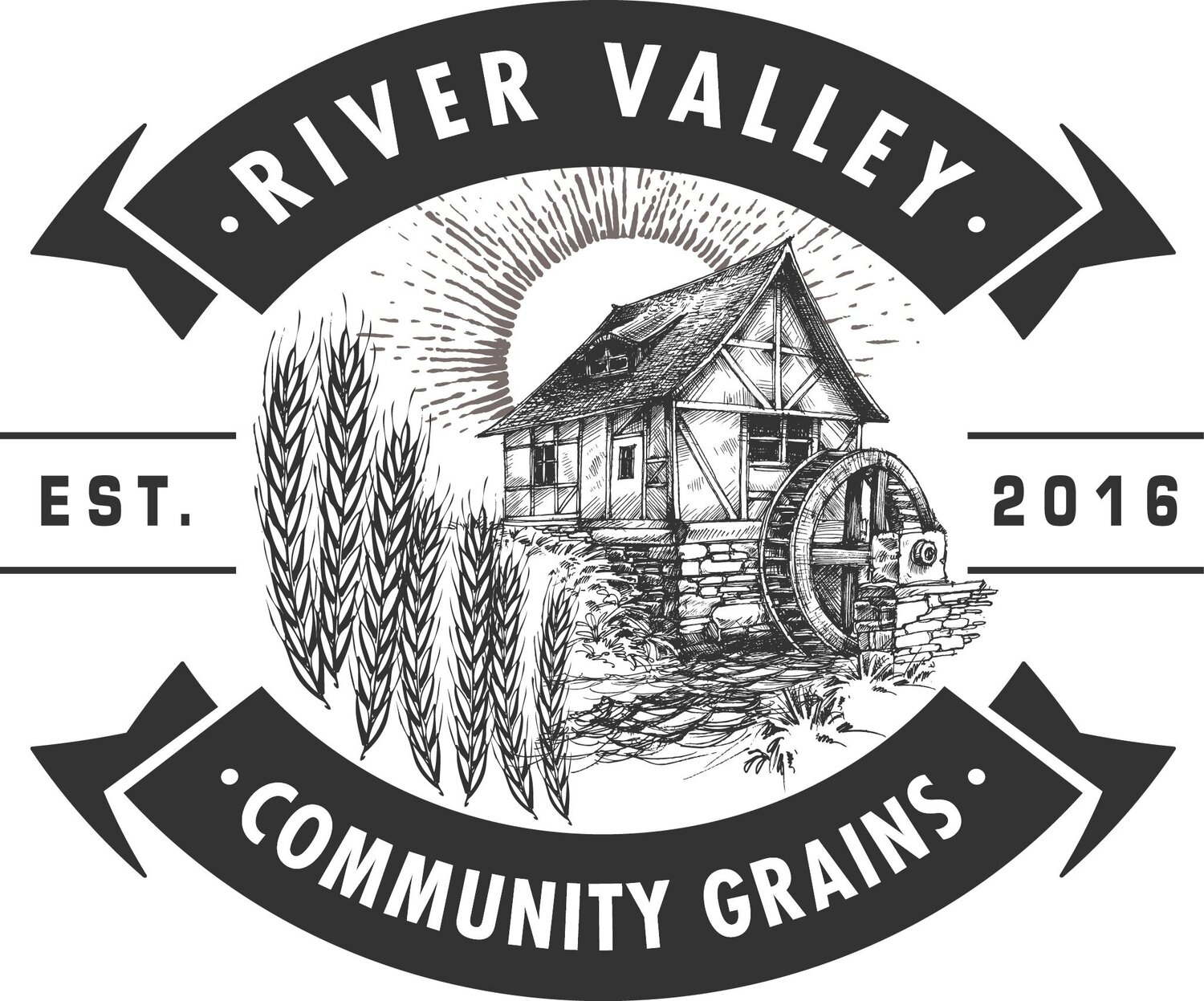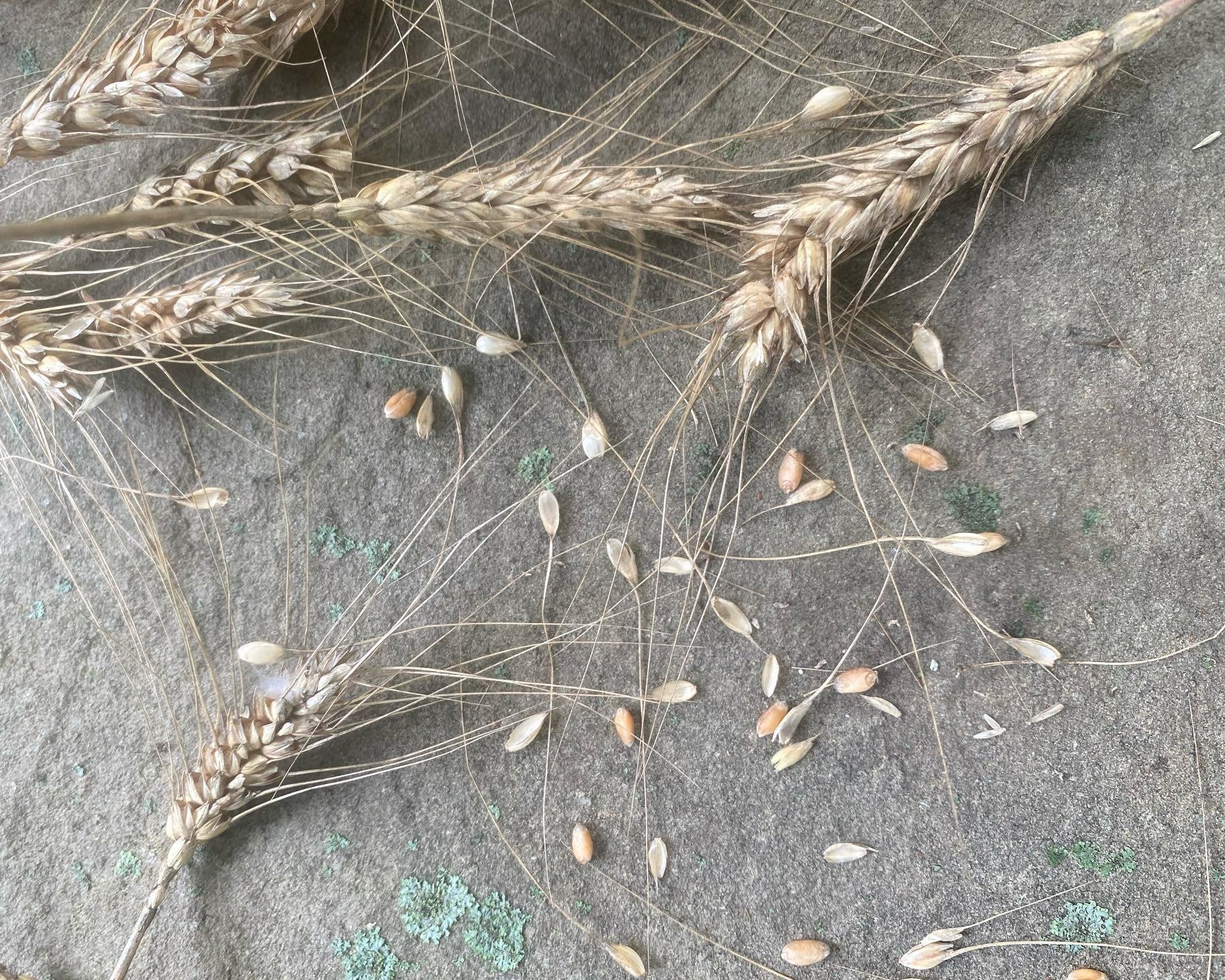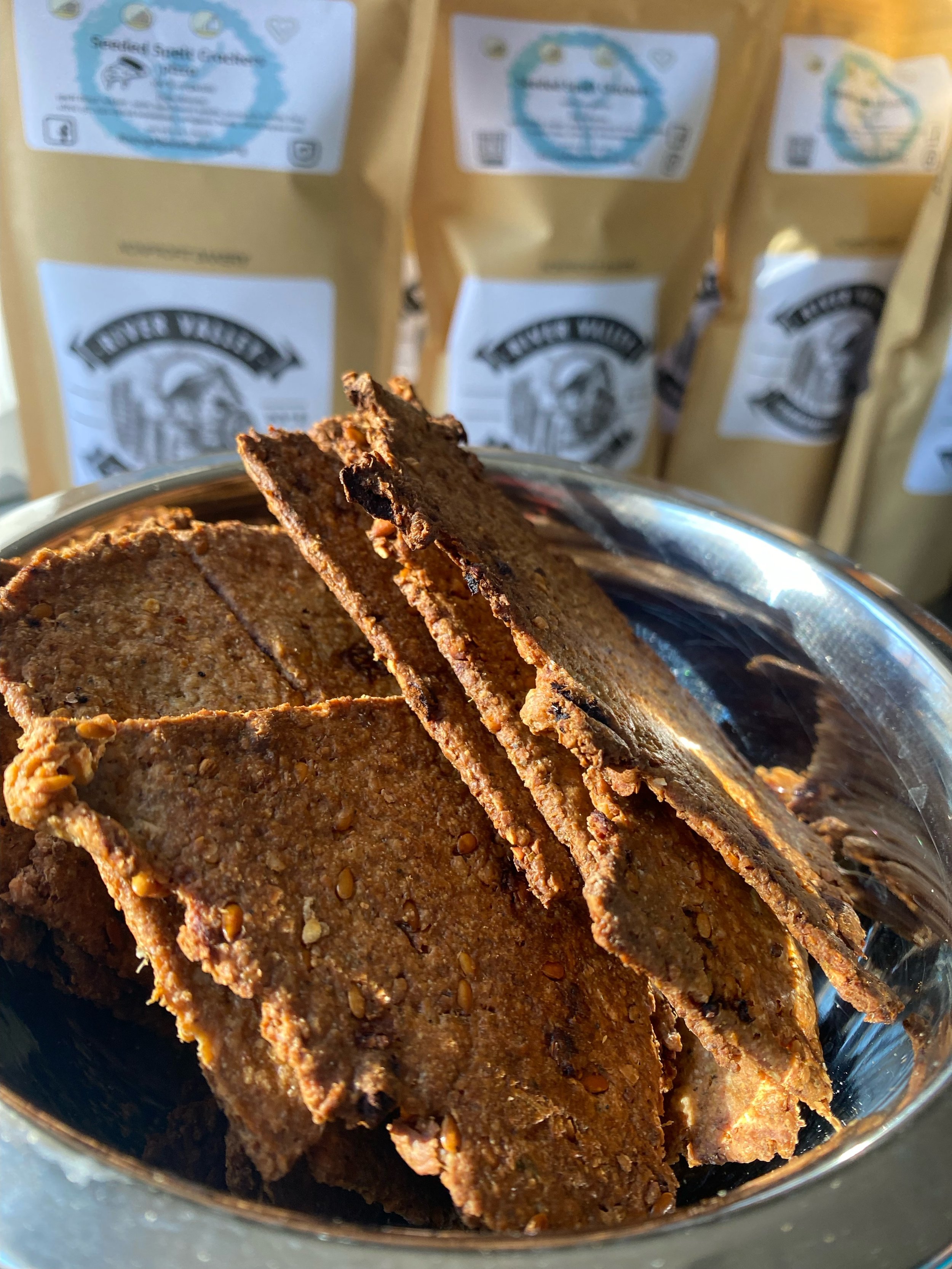
WHAT’S NEW
New Highlands Grant Will Help Build Grain Hub
We’re part of a three-year grant from the NJ Highlands Council to grow the local grain economy using regenerative agriculture. We can’t wait to see where this work leads!
One of the most exciting aspects of our crazy River Valley Community Grains experiment is finding partners to leverage the impact of our work. Recently the Foodshed Alliance secured a three-year grant from the New Jersey Highlands Council Sustainable Agriculture Program to grow the local grain economy in the Highlands using regenerative agriculture. Through research, outreach, and (literal) field training, we’re looking forward to spreading the word about the possibilities local grains offer New Jersey farmers and how they play into the future of our food system.
We’ll be working with the Foodshed Alliance and Elizabeth Dyck of OGRIN to create a white paper, curriculum, and training program for farmers interested in raising heritage grains, targeted towards issues and conditions specific to the NJ Highlands region.
The next step is doing outreach and networking to recruit growers to the project, and spreading the word about the resources we can offer them. We’ll be encouraging farmers to attend educational events like a series of workshops on post-harvest grain handling, grain processing, and meeting grain quality standards. River Valley Community Grains and OGRIN staff will visit farms and mentor farmers who want to learn about small-scale organic grains. This project will also make mobile grain cleaning and processing equipment available that can be shared and transported to farms.
Once we’ve got new folks on board, the project will help those farmers put their new knowledge into action. We will host grain hub workshops on to cleaning, storing, milling, packaging, and sell local grains, using the commercial kitchen and educational facility at Marksboro Mills as a model that can be replicated throughout the region.
Then we start collaborating within our network of farmers, millers, maltsters, brewers, bakers, distillers, restaurateurs, educators, researchers, and consumers like home bakers and homebrewers. Each of these stakeholders is essential to the success of our local grain hub.
Our ultimate goal is for these three years of work to culminate in a branding campaign to have “A Product of the Highlands of New Jersey” added to the packaging on grains grown and processed here. Supporting New Jersey farmers, building the local economy, and sharing that pride of place are all pillars of our work here at RVCG, and we can’t wait to see where this grant leads us.
Recipe: Soft Honey Whole Wheat Rolls
Winter is the perfect time to bake, and these pillowy soft rolls are equally suitable for your holiday table or alongside a hearty soup on a wintry weeknight.
Winter is the perfect time to bake! The heat from the oven warms your home, and the comforting smell of fresh bread lingers in the air. This recipe for dinner rolls, made with 100% whole wheat flour, bake up pillow-soft and have a hint of sweetness from a spoonful of honey. They’re equally suitable for your holiday table or alongside a hearty soup on a wintry weeknight.
Soft Honey Whole Wheat Rolls
1 cup (240ml) whole milk, warmed to about 110°F (43°C)
2 1/4 teaspoons instant yeast
1/2 cup (113g, or 1 stick) butter (salted or unsalted, your preference), softened and cut into 4 pieces
1/3 cup (113g) honey
2 large eggs
1 teaspoon salt
4 3/4 cups (570g) River Valley Community Grains whole wheat flour, plus more for kneading/shaping
2 tablespoons (28g) unsalted butter, melted
flaky salt for sprinkling
Make the dough: Whisk the yeast into the warm milk and let sit for 5 minutes. Pour into the bowl of a stand mixer fitted with a dough hook or mixer attachment. (Use a large mixing bowl if you don’t have a stand mixer).
On low speed, beat in the softened butter, then the honey, eggs, and salt. Don’t be alarmed if the butter isn’t blending into the mixture. Gradually add the flour and mix, either on the lowest speed possible or by hand with a wooden spoon (my preferred method). Increase speed to medium until a soft dough forms, then to medium-high for 6-7 more minutes. The dough is ready when it gently bounces back when you poke it with your finger. If the dough is too sticky, add more whole wheat flour 1 tablespoon at a time. (If you do not have a stand-mixer with a hook attachment, knead the dough by hand in this step.)
Transfer the dough to a lightly floured surface and knead with your hands for 1 minute. Form into a ball, coat your mixing bowl with nonstick spray or olive oil, and place the dough back in, turning it over so all sides are coated. Cover loosely and let sit in a warm place until doubled in size, about 1.5–2 hours.
Shape the rolls: Turn the dough out onto a lightly floured work surface. Using floured hands, stretch into a 9×13” rectangle (doesn’t need to be exact) and cut into 16 rolls. Form the pieces into balls, trying not to deflate the dough too much, and arrange in a greased 9x13” pan. Loosely cover and allow to rise in a warm environment again until puffy and doubled in size, about 1 hour.
Bake the rolls: Preheat the oven to 375°F (191°C). Bake rolls for about 25 minutes or until golden brown. About halfway through the bake time. Remove pan from the oven and brush with melted butter, then sprinkle with flaky salt. Sprinkle with sea salt. Serve warm.
Makes 16 rolls. Recipe by Kate Munning, inspired by Sally’s Baking Addiction.
We're on Our Grind
This week our new 48-inch New American stone mill arrived. How will this equipment impact the capacity, consistency, and quality of the milled products we offer? Read on.
This week our new 48-inch New American stone mill arrived. New American Stone Mills was founded with the aim to return to a rich milling and time-honored baking tradition, and they produce some of the highest quality mills available in the country. This equipment is going to have a profound impact on the capacity, consistency, and quality of the milled products we offer. Made of Vermont Barre granite, and with a capacity of 300 pounds, we will now be able to mill larger quantities of the heritage grains our local farmers are growing and more closely monitor the quality of the flours.
Milling flour in this way is simple and elegant: two granite stones sheer and crush the grain into an exceptional flour that contains all of the natural, vitamin-rich oils from the germ (or embryo) of the grain. Most store-bought flours are produced using roller mills, which typically remove the germ from the grain to increase shelf-life for mass markets, but which also removes vital nutrients, and delicious flavors and aromas.
Big thanks to Andrew Heyn at New American for delivering, installing, and training us on our new stone mill. You can learn more about their company’s mission and commitment to quality here. While our countertop workhorse KoMo Fidibus mills have served us well over the years, scaling up like this is a total game changer.
NJ Monthly: These ‘Farmpreneurs’ are Revolutionizing Agriculture in NJ
We are profoundly grateful to NJ Monthly magazine, writer Julia Martin, and photographer John Bessler for their generous and thorough profile of River Valley Community Grains and for coming out to visit us at our new home, Marksboro Mills.
For the founders of RVCG, the challenges are well worth it. With a strong demand for artisanal grains, their business is thriving. Farmers get more per pound for heirloom grains than for feed crops, along with the benefits to the local economy. Even with the extra costs associated with organic grains, including fees to RVCG for their services and time transitioning fields to chemical-free soil, many are finding it worthwhile to make the switch.
You can read the entire article here. And of course, if there’s any way you’d like to be involved in River Valley Community Grains, drop us a line anytime!
Recipe: Pumpkin Spice Overnight Oats
Are you ready for the coziest breakfast ever? Try these pumpkin spice overnight oats—perfect for a grab-and-go breakfast or to warm up a leisurely morning.
Are you ready for the coziest breakfast ever? Try these pumpkin spice overnight oats! Now that the temperature is dropping and we’re officially back in the swing of our hectic fall schedules, having a nutritious, delicious recipe like this one in your pocket can significantly improve your busy week. You can make these oats ahead for a perfect grab-and-go breakfast before work or school, but they’re also delicious eaten warm on a leisurely autumn morning.
Pumpkin Spice Overnight Oats
1 cup River Valley Community Grains rolled oats
1 ¼ cups milk of choice
1/3 cup pumpkin purée
2 tablespoons maple syrup
Pinch of allspice, clove, and nutmeg, or 1/2 teaspoon pumpkin pie spice
½ teaspoon cinnamon
¼ teaspoon salt
2 teaspoons chia seeds (optional)
2 teaspoons flax meal (optional)
In a jar or bowl, combine the oats, milk, and pumpkin. Stir until combined.
Add the maple syrup, spices, chia, and flax seeds and mix again.
Refrigerate the oats: 12-24 hours for thicker oats and 2-6 hours for a thinner consistency. They’ll last about 5 days in the fridge.
Notes:
You can add dried cranberries, a spoonful of nut butter, pumpkin seeds, or protein powder to give these oats a flavor or nutrient boost.
These oats are extra cozy when eaten warm. Either pop them in the microwave for 90 seconds after they soak, or if you’re in a hurry, microwave for 4 minutes right after mixing the ingredients together (stir halfway through cooking time). They can also be simmered on the stovetop for 5 minutes.
Makes 2 servings. Adapted from Justine Doiron.
"Grains of Change" in Edible Jersey
We’re thrilled that Ruthie’s ambitious idea to establish Marksboro Mills and our River Valley Community Grains journey are featured in the Fall 2023 issue of Edible Jersey.
We’re thrilled that Ruthie’s ambitious idea to establish Marksboro Mills and our River Valley Community Grains journey are featured in the Fall 2023 issue of Edible Jersey. Big thanks to Fran McManus for telling our story so well, and to Miana Jun for the terrific photos.
Just as Perretti was giving up her search for a mill, she received a call from Sister Miriam MacGillis of nearby Genesis Farm.
“She reached out to me asking if I would like to grow grain organically. That there are some millers that are just starting out. I was completely intrigued.” The millers were Lenny Bussanich, Mike Hozer, and Larry Mahmarian, a trio of friends who, in 2016, formed River Valley Community Grains (see Edible Jersey, High Summer 2018), a local grain hub that assists growers in converting land into organic grain production for human consumption and then provides support services—cleaning, milling, packaging, and marketing—for that grain.
River Valley Community Grains grew out of a project at Genesis Farm that sought to restore and protect the Musconetcong River Valley. The trio recognized that encouraging and facilitating the use of regenerative farming practices within the Musconetcong watershed would be a major step toward protecting the health of the river. Grains were chosen because they were already being grown as livestock feed on many of these farms, so the farmers had essential farming experience and equipment. Of equal importance to Bussanich, Hozer, and Mahmarian was the return of fresh, nutritious, flavorful, heritage grains into the local food supply.
Bringing in the Harvest
The Redeemer Winter Wheat at Ruthie’s Farm is off the fields and the harvest is complete! Learn more about what goes into a grain harvest.
The Redeemer Winter Wheat at Ruthie’s Farm is off the fields and the harvest is complete!
How can we tell when the wheat is ready to harvest? Just like every other aspect of this work, we pay close attention, using our experience and our senses. One way to test wheat’s readiness is to rub the ear of the stalk to release the berries and then bite them. If they are hard and crack, the wheat is ready! But if it’s soft or gummy, it needs more time.
Instead of pesticides, we use red clover as a cover crop to suppress to suppress the weeds, particularly Canadian thistle. We don’t want to apply chemicals to the land since we are building soil health for both people and the planet.
As always, thank you to Dr. Elizabeth Dyck of OGRIN (Organic Growers' Research and Information-Sharing Network) for her guidance and expertise from the beginning of this project. Dr. Dyck’s professional expertise with soil management and crop production has been invaluable over the years as we aid farmers in growing these heritage grains. Ruthie’s grower John Bennet also deserves applause for the work he has done in supporting our work bringing back naturally grown regional grains.
After harvesting, we sent the grain off to a test lab to ensure it is viable for human consumption. We don’t want the fungus known as fusarium or vomitoxin (yuck, the name sounds awful!) to take hold. The test results showed a safe level of under 1 parts per million (ppm), so now we do the hard work of cleaning the grain and storing it in our shiny new hopper so it’s ready for us to mill into fresh flour and sell to consumers and professional bakers. Hurray for New Jersey grains!
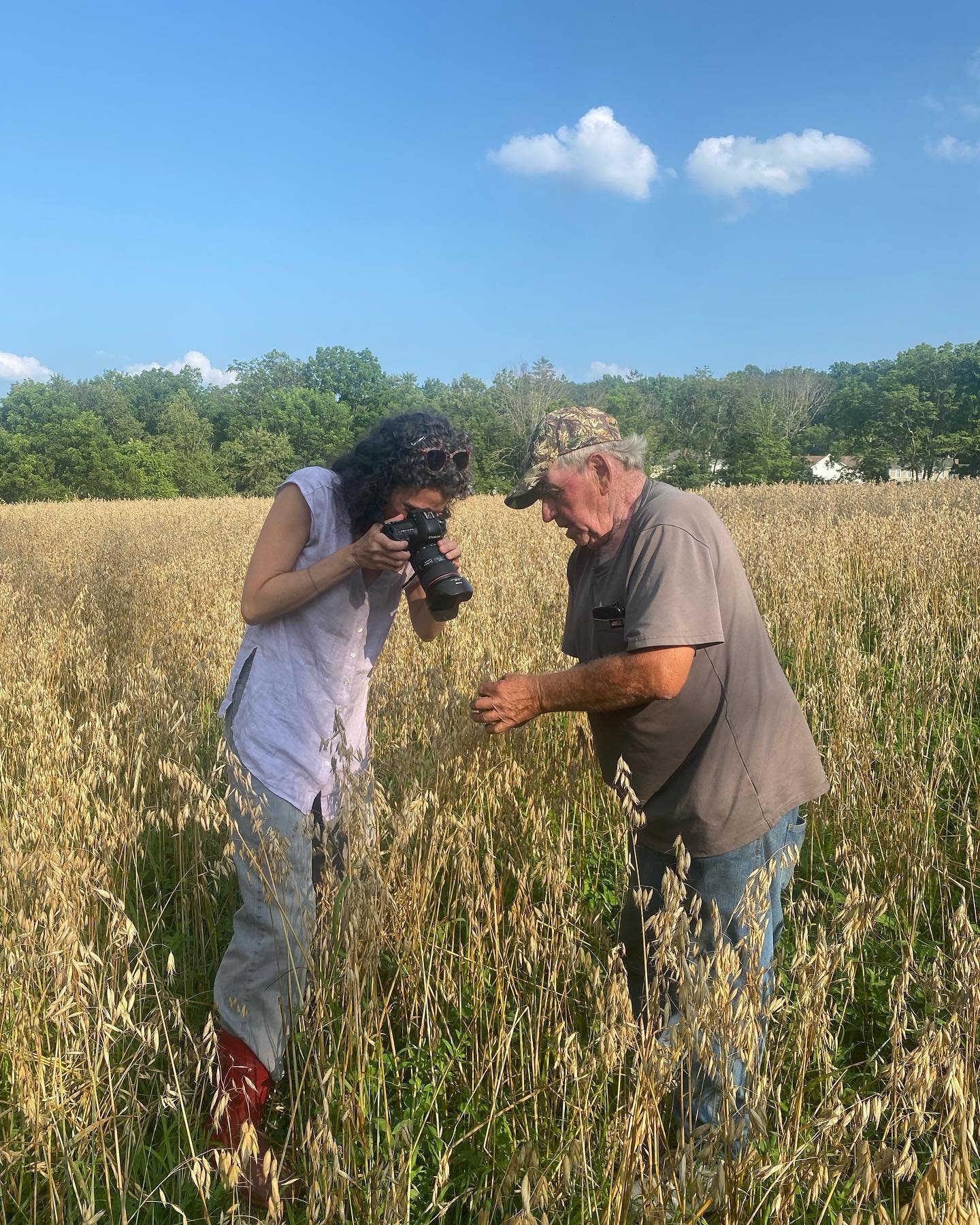
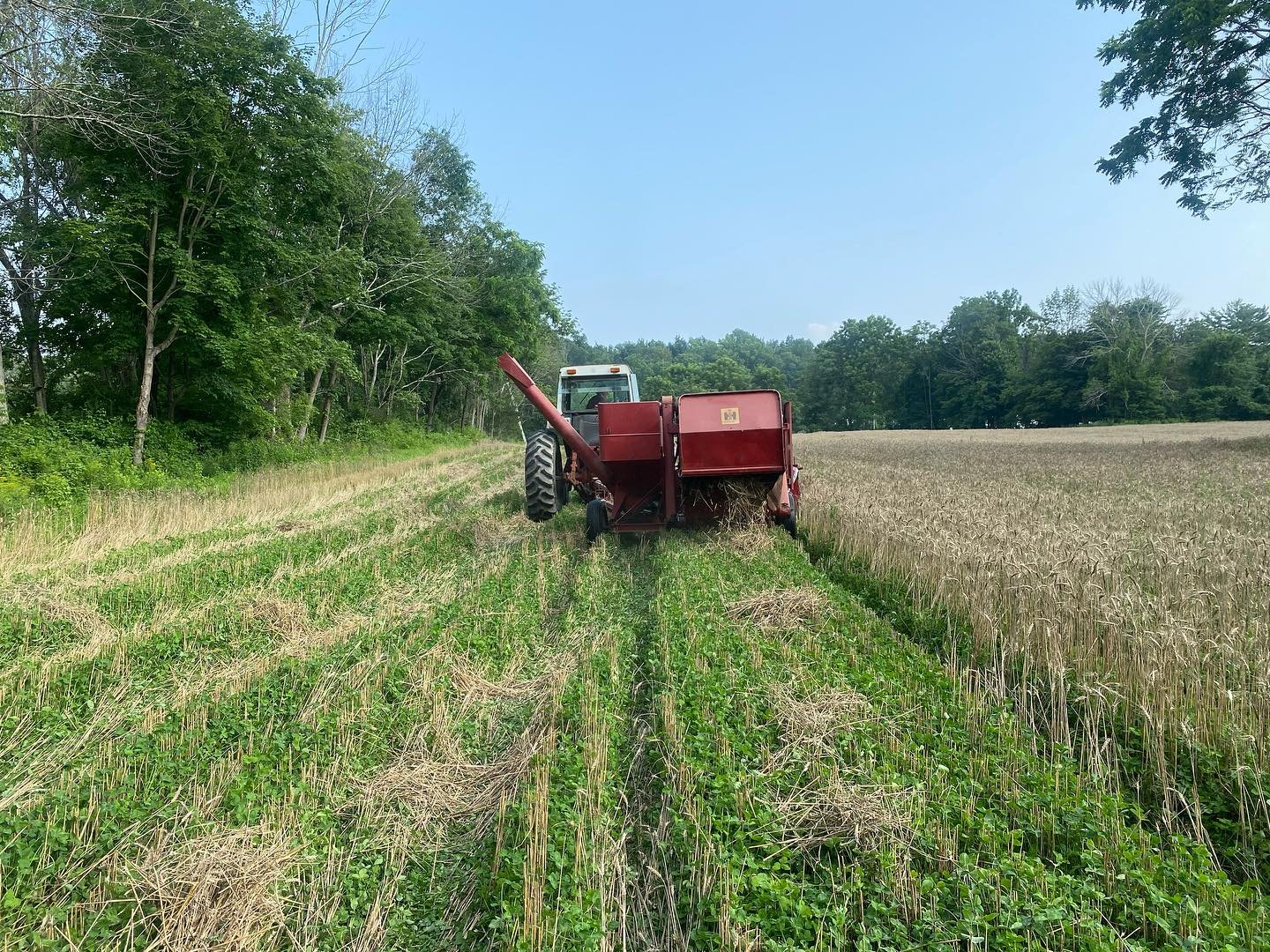
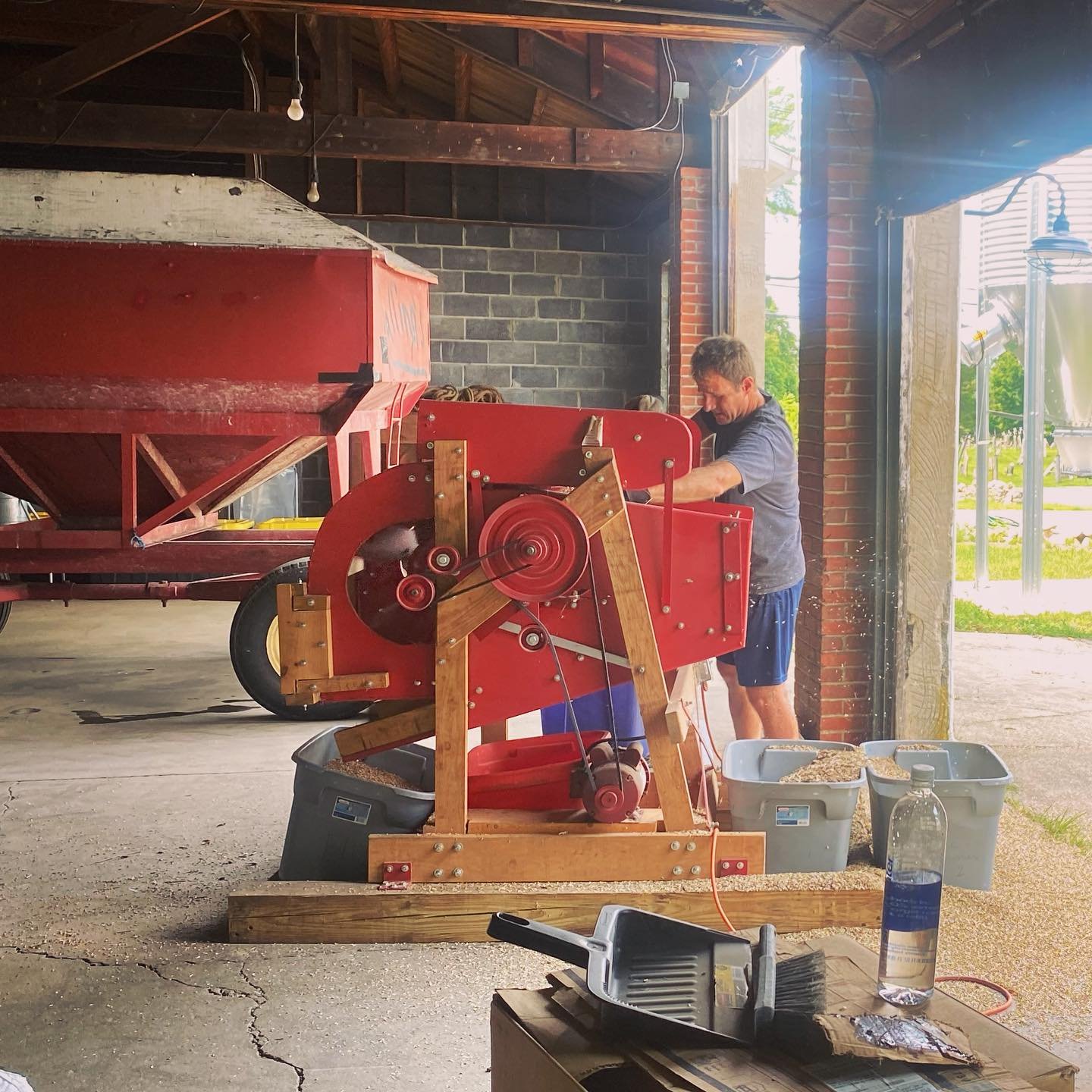
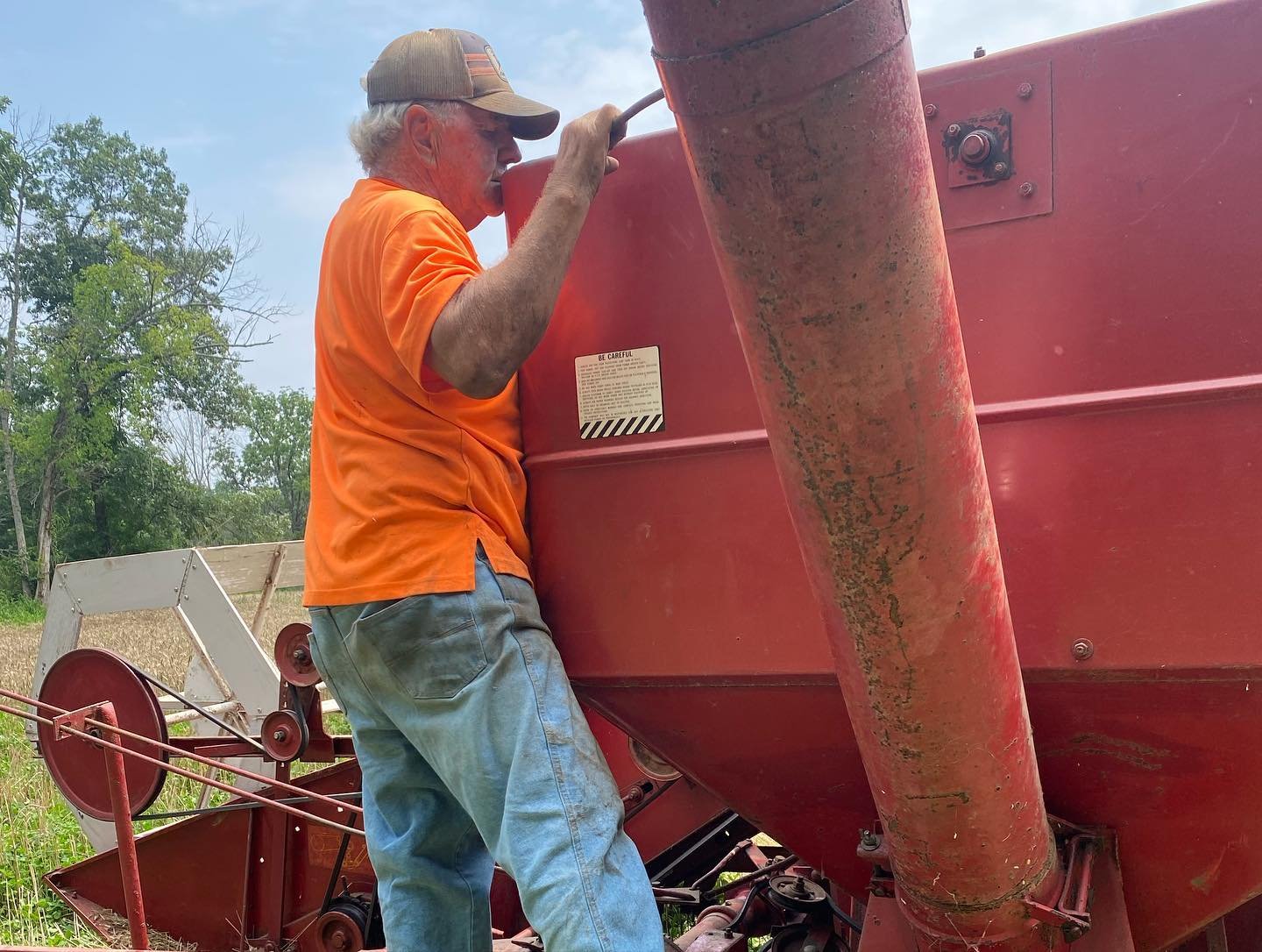
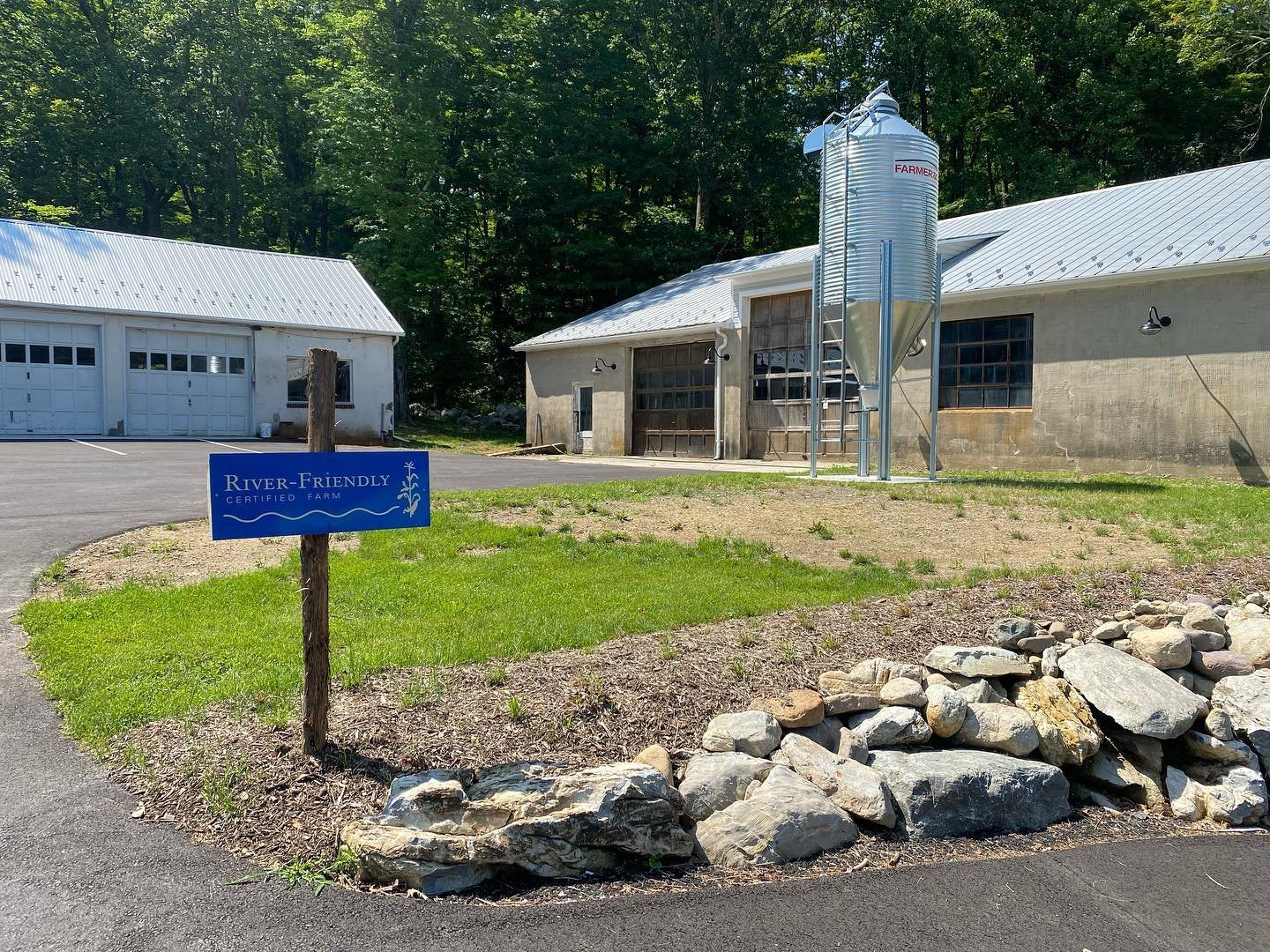
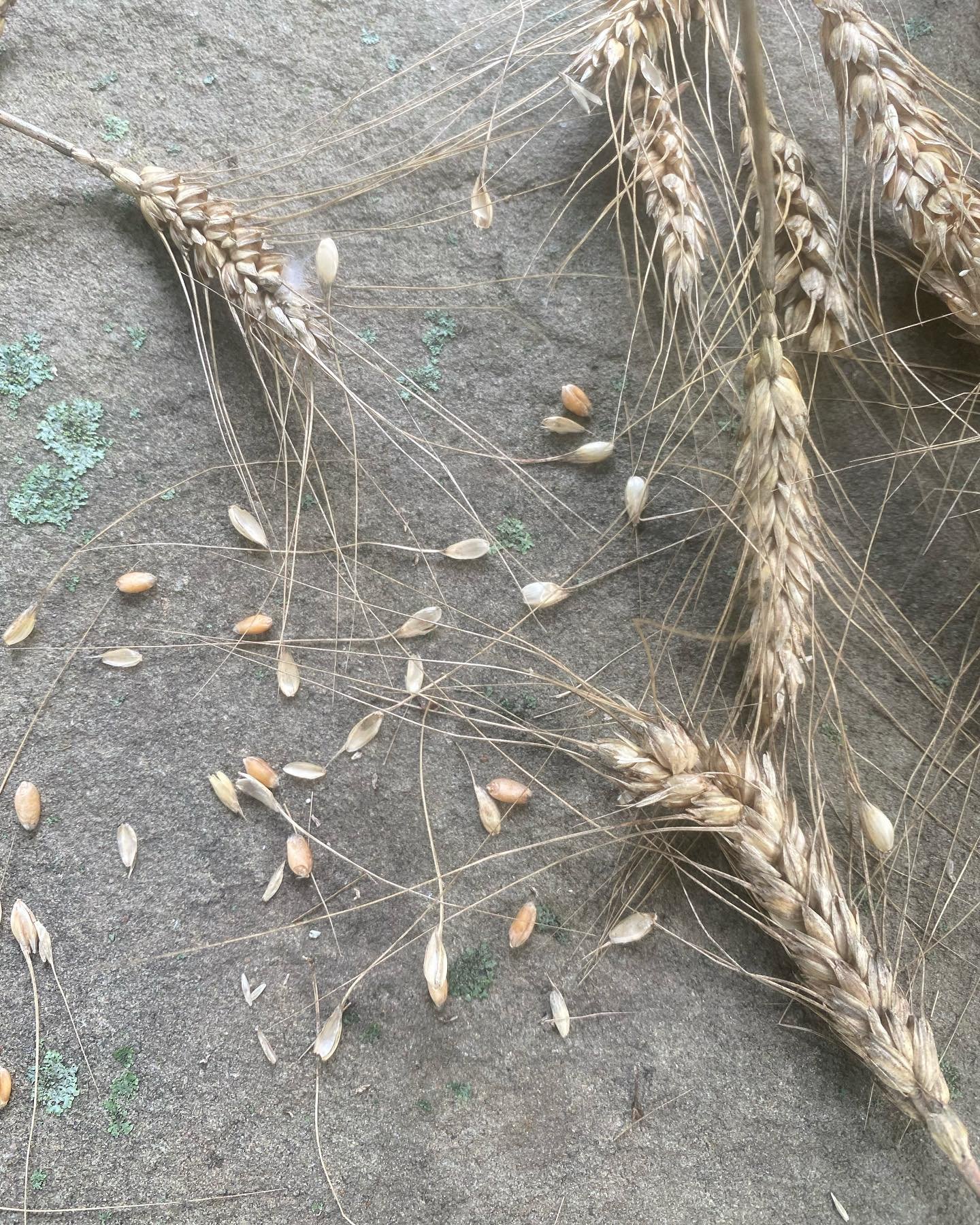
Recipe: Sour Cream Blueberry Muffins
Blueberries are everywhere right now! Take the opportunity to make these quick and delicious blueberry muffins. They bake up fluffy and moist and flavorful—always a crowd pleaser—while the cinnamon and citrus contribute some zest.
Surely you know it’s blueberry season right now. They’re everywhere: Jersey berries from Hammonton on sale at the supermarket, in little cardboard cartons at the farmers’ market, at the pick-your-own farms, and maybe even in your own garden. We like to buy them in bulk and freeze (after gorging on big handfuls of them fresh, of course) so we can make these quick and delicious blueberry muffins all year long. They bake up fluffy and moist and flavorful—always a crowd pleaser—while the cinnamon and citrus contribute some zest.
You can add walnuts to this recipe if you like, but if you use River Valley whole wheat flour, the nutty flavor of the fresh grains really comes through in this simple recipe.
Sour Cream Blueberry Muffins
1 cup brown sugar, unpacked
1/2 cup vegetable oil
2 eggs
1 cup sour cream
1 teaspoon vanilla extract
zest of one orange or lemon
2 cups RVCG all-purpose flour
1/2 teaspoon salt
1/2 teaspoon baking soda
1 teaspoon ground cinnamon
1 generous cup fresh (or frozen) blueberries
Set the oven to 400°F and mix the batter while it heats. Whisk together the brown sugar, eggs, vegetable oil, sour cream, and vanilla extract for a minute or two. Stir in the citrus zest. In another bowl (or even on top of the wet ingredients if you work quickly), combine the flour, salt, baking soda, and cinnamon. Stir gently until almost combined, then add the blueberries and stir until incorporated.
Drop spoonfuls of batter into a greased muffin tin and bake for 20 minutes, turning the pan 180° halfway through. Muffins are baked through when the edges are golden and a toothpick inserted comes out clean.
Building a Grainshed (literally!)
As we grow, we are able to address these missing pieces in the small-scale local grain economy. One of those gaps is safe, clean storage for large amounts of grain.
A new grain storage bin went up at Marksboro Mills last week, and we are very excited. Sure, we proud of every step forward in this adventure, but this one feels especially meaningful. Over the past five years, we have been able to recruit farmers to grow heritage grains using regenerative methods, and we’ve been able to mill those grains ourselves. We’re grateful for the customers who keep coming out to buy our products, for the bakers who turn the flour and oats into the tastiest breads, cakes, granolas, cookies, and so much more.
But in order for River Valley Community Grains to be truly sustainable, and in order to scale up, we need to fill in some gaps that remain in the infrastructure. As we grow, we are able to address these missing pieces in the small-scale local grain economy. One of those gaps is safe, clean storage for large amounts of grain. This storage bin will hold all of the Redeemer winter wheat that was grown at Ruthie’s farm across the street, so it will remain fresh and we will be able to mill it on demand. Look at all those gorgeous waves of grain!
Thank you for coming along for the ride as we built this local grain hub. We’re constantly fine-tuning, improving, and trying to do better for all of the people and small businesses who are our stakeholders and friends.
Interview: Rising Above Bakery
Rising Above Bakery makes premium baked goods by hand from the finest ingredients. The bakers are mostly young adults with special needs and learning differences who are learning the ways of the bakery while acquiring valuable life skills, pride, and self-sufficiency through the craft of baking.
Rising Above Bakery serves Bergen County (NJ) and Rockland County (NY) with premium breads and other baked goods made by hand from the finest ingredients. The bakers are mostly young adults with special needs and learning differences who are learning the ways of the bakery while acquiring valuable life skills, pride, and self-sufficiency through the craft of baking.
We had the opportunity to chat with founder Shiri Reuveni-Ullrich about what prompted her to embark on this unique project and what she likes best about River Valley Community Grains—both the products and the people behind them.
RVCG: Tell us about Rising Above Bakery.
SRU: We are primarily a sourdough bread bakery, using primarily organic ingredients that are sourced as locally as we can. We also make cookies and scones. Our mission as a 501(c)(3) nonprofit organization is to develop independent, empowered bakers who possess the skills and self-confidence needed to live independent, fulfilling lives: Getting up each morning motivated to start the day and go to work, meeting people and taking part in social interactions in an inclusive environment. We aspire to achieve this while building a self-sustaining business that is a valued member of its local community.
RVCG: How did you get here?
SRU: I’m a pediatric speech therapist by trade. For many years I worked with young adults, and I began to realize how dire the situation is in the outside world after they graduate school at 21. I wanted to create something meaningful and help them find jobs. I wanted to give them something that makes them want to get up in the morning and do satisfying work.
Once the mission presented itself, I was determined to create the bakery. So I quit my job and went to school for restaurant entrepreneurship. I had always been a baker, but the formal education gave me the language and the terminology, the foundation to start a food service business. We raised a little bit of money and launched the baking operation in my dining room. Unfortunately, that’s when covid hit. So it’s been a challenge for the past few years, making bread and developing a line of products at home.
We slowly grew a crew of 25 employees working at Rising Above, and now we have a storefront in Nyack that’s open to the public, thanks to Rockland Community College. Our next goal is to secure a storefront location, ideally in Bergen County, where we can further develop our vision of a practical, financially viable, community-building business.
RVCG: What’s your favorite item to make with River Valley Community Grains products?
SRU: Probably the spelt flour and oat crackers that we sell at the farmers market; it flies off the shelves! I first ate crackers like this in Israel, which is where I’m from. I happened to meet a person who made these wonderful crackers, and surprisingly, she was also running a bakery for people with special needs! I knew I had to make them myself.
RVCG: How did you get connected with River Valley Community Grains?
SRU: In the very early stages, Lenny called me and talked about his products. I said, “All right, let’s try it.” He brought me a 5-pound bag of flour three years ago, and we’ve been cooking a signature loaf with RVCG flour ever since. The kids call it “Lenny bread”!
I wish we could use local heritage products for all of our baked goods, but it’s expensive. We do as much as we can, and working with RVCG has been a very satisfying friendship and collaboration. What RVCG is doing is absolutely phenomenal—bringing heritage wheat to our area and encouraging people to use it. I hope more and more people come on board.
RVCG: We hope so, too!
Visit Rising Above Bakery’s website to purchase products online and find pickup locations in New Jersey and New York.
